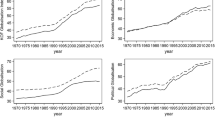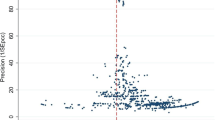Abstract
We examine the relationship between cyclical fluctuations and macroeconomic, institutional, and cultural indicators for 46 countries from Europe and the Mediterranean basin. In the Mediterranean cycles are different: the duration of expansions is shorter; the amplitude of recessions is larger; and cyclical synchronization is smaller than elsewhere. Differences in cultural indicators have strong and significant associations with differences in the persistence and volatility of cyclical fluctuations and their synchronization.



Similar content being viewed by others
Notes
“Spain’s Jobless Rely on the Family, A Frail Crutch,”by Suzanne Daley, July 28, 2012.
For robustness we have also calculated the turning points using per-capita GDP data where available - see Table A.2 in the Online Appendix: Do Institutions and Culture Matter for Business Cycles? (http://home.ku.edu.tr/~saltug/OnlineResources/onlineapp.pdf). We stick to our initial classification because with per-capita data many countries fail to display at least one complete cycle and the business cycle phases that are generated are counterfactual - for example, recessions tend to last longer than expansions.
However, these data are not available for every country for each year of the sample. Hence, we compute the measure of bilateral trade linkages between country i and j reported in the text for the years in which these data are available, and then take an average across the years.
Because in our sample only Algeria and Russia are major oil/gas producers, the Dutch disease-type effects deriving from changes in commodity prices are minor in our sample and we do not control for them in the analysis.
There is evidence that countries that are more dissimilar in their individualistic traits tend to experience contractions that are closer in length, suggesting that there is not a uniform association between the business cycle characteristics and the different traits.
We also find that larger differences in the importance attached to the family across the lead to greater business cycle synchronization in both the full sample and the Mediterranean sample. This finding may reflect the nature of business cycle synchronization for the Mediterranean countries, which tend to exhibit greater co-movement with countries outside of their group than amongst each other.
Guiso et al. (2013) argue that policy-makers in countries which are differentiated in terms of their culture may face a “conformity constraint”, which makes its difficult for them to adopt policies that violate the cultural norms in their societies. They use this framework to rationalize the poor management of the Greek crisis in the context of EU-wide decision-making.
References
Acemoglu D, Johnson S, Robinson J (2001) The Colonial Origins of Comparative Development: An Empirical Investigation. Am Econ Rev 91:1369–1401
Acemoglu D, Johnson S, Robinson J (2006) Institutions as a Fundamental Cause of Long-run Growth. In: Aghion P, Durlauf S (eds) Handbook of Economic Growth. North-Holland, Amsterdam
Aguiar M, Gopinath G (2007) Emerging Market Business Cycles: The Cycle is the Trend. J Polit Econ 115:69–102
Alesina A, Giuliano P (2010) The Power of the Family. J Econ Growth 15:93–125
Alesina A, Summers L (1993) Central Bank Independence and Macroeconomic Performance: Some Comparative Evidence. J Money Credit Bank 25:151–162
Algan Y, Cahuc P (2013) Trust, Growth, and Well-Being: New Evidence and Policy Implications, CEPR DP 9548.
Altug S, Bildirici M (2012) Business Cycles in Developed and Emerging Economies: Evidence from a Univariate Markov Switching Approach. Emerg Markets Finan Trade 48(6):73–106
Altug S, Emin M, Neyapti B (2012) Institutions and Business Cycles. Int Financ 15(3):347–366
Baxter M, Kouparitsas M (2005) Determinants of Business Cycle Co-movement: A Robust Analysis. J Monet Econ 52:113–157
Bentolila S, Ichino A (2008) Unemployment and Consumption Near and Far Away from the Mediterranean? J Popul Econ 21:255–280
Benczur P, Ratfai A (2010) Business Cycles around the Globe, Central European University, manuscript.
Bertocchi G, Canova F (2002) Did Colonization Matter for Growth? An Empirical Investigation on the Causes of Africa’s Underdevelopment. Eur Econ Rev 46:1851–1871
Blanchard O, Summers L (1986) Hysteresis and the European Unemployment Problem. NBER Macroeconomics Annual, Cambridge, pp 15–78
Braudel F (1998) The Mediterranean in the Ancient World. Penguin Books, London
Canova F, Ciccarelli M (2012) ClubMed? Business Cycles in the Mediterranean Basin. J Int Econ 88:162–175
Canova F, Schlaepfer A (2011) Mediterranean Business Cycles: Structure and Characteristics, Journal of Applied Econometrics.
Canova F, Ciccarelli M, Ortega E (2012) Do Institutional Changes Affect Business Cycles? Evidence from Europe. J Econ Dyn Control 36:1520–1533
Caselli F, Gennaioli N (2012) Dynastic Management. Econ Inq 51:971–996.
Chang Y, Hwang S (2011) Asymmetric Phase Shifts in the U.S. Industrial Production Cycles, manuscript.
Cukierman A, Miller G, Neyapti B (2002) Central Bank Reform, Liberalization and Inflation in Transition Economies – An International Perspective. J Monet Econ 49:237–264
Easterly W, Levine R (2003) Tropics, Germs, and Crops: How Endowments Influence Economic Development. J Monet Econ 50:3–39
Fernandez R (2008) Culture and Economics. In: Durlauf SN, Blume LE (eds) The New Palgrave Dictionary of Economics, 2nd edn. Palgrave Macmillan
Fernandez R, Fogli A (2009) Culture: An Empirical Investigation of Beliefs, Work, and Fertility. Am Econ J Macroecon 1:146–177
Fonseca R, Patureau L, Sopranath T (2009) Divergence of Labor Market Institutions and International Business Cycles. Ann Econ Stat 95(96):279–314
Fonseca R, Patureau L, Sopranath T (2010) Business Cycle Comovement and Labor Market Institutions: An Empirical Analysis. Rev Int Econ 18(5):865–881
Garcia-Cicco J, Pancrazi R, Uribe M (2010) Real Business Cycles in Emerging Economies? Am Econ Rev 100:2510–2535
Glaeser E, La Porta R, Lopez-de-Silanes F, Schleifer A (2004) Do Institutions Cause Growth? J Econ Growth 9:271–303
Gnocchi S, Pappa E (2011) Do Labor Market Rigidities Matter for Business Cycles? Universitat Autonoma de Barcelona, manuscript.
Gorodnichenko Y, Roland G (2010) Culture, Institutions, and the Wealth of Nations, NBER WP 16368
Gorodnichenko Y, Roland G (2011) Which Dimensions Matter for Long-run Growth? Am Econ Rev Pap Proc 101(3):492–498
Greif A (1994) Cultural Beliefs and the Organization of Society: A Historical and Theoretical Reflection on Collectivist and Individualistic Societies. J Polit Econ 102:912–950
Grilli V, Masciandro D, Tabellini G (1991) Political and Monetary Institutions and Public Financial Policies in the Industrial Countries. Econ Policy 13:341–392
Guiso L, Herrera H, Morelli M (2013) A Cultural Clash View of the EU Crisis, CEPR DP 9679.
Guiso L, Sapienza P, Zingales L (2004) The Role of Social Capital in Financial Development. Am Econ Rev 94:524–554
Guiso L, Sapienza P, Zingales L (2006) Does Culture Affect Economic Outcomes? J Econ Perspect 20:23–48
Hall R, Jones C (1999) Why Do Some Countries Produce So Much More Output per Worker than Others? Q J Econ 114:83–116
Harding D, Pagan A (2005) A Suggested Framework for Classifying the Modes of Cycle Research. J Appl Econ 20:151–159
Hofstede G (2001) Culture’s Consequences: Comparing Values, Behaviors, and Organizations across Countries, Beverly Hills, CA: Sage Publications (second edition).
Imbs J (2004) Trade, Finance, Specialization, Synchronization. Rev Econ Stat 86:723–734
Imbs J (2010) The First Global Recession in Decades. IMF Econ Rev 58:327–354
Inglehart R, et al (2000) World Values Surveys and European Values Surveys, 1981-1984, 1990-1993, and 1995-1997, Ann-Arbor, Michigan, Institute for Social Research, ICPSR version
Jorda O, Schularick M, Taylor A (2011) When Credit Bites Back: Leverage, Business Cycles, and Financial Crises, CEPR DP 8678
Kaufmann D, Kraay A, Mastruzii M (2009) Governance Matters VIII: Aggregate and Individual Governance Indicators, 1996–2008, World Bank Policy Research Working Papers, No.4978.
Knack S, Keefer P (1995) Institutions and Economic Performance: Cross-Country Tests Using Alternative Institutional Measures. Econ Polit 7:207–27
Kose A, Otrok C, Prasad E (2012) Global Business Cycles: Convergence or De-coupling? Int Econ Rev 53(2):511–538
North D (1990) Institutions, Institutional Change and Economic Performance, Cambridge: Cambridge University Press
Rumler F, Scharler J (2011) Labor Market Institutions and Macroeconomic Volatility in a Panel of OECD Countries. Scott J Polit Econ 58(3):396–413
Tabellini G (2010) Culture and Institutions: Economic Development in the Regions of Europe. J Eur Econ Assoc 8:677–716
Weber M (1904) The Protestant Ethic and the Spirit of Capitalism, 1976th edn. George Allen and Unwin, London
Acknowledgments
We would like to thank Benjamin Born, Tullio Jappelli, Marco Manacorda, Evi Pappa, Johannes Spinnewijn, Matteo Ciccarelli and the participants of seminars at the University of Cyprus, CRETE 2012, the 56’th Economic Policy Panel Meeting, and Konstanz Monetary Conference, 2013 for comments and suggestions. Part of the work was conducted while Canova was also associated with ICREA-UPF, the Barcelona GSE and the CREMED. Canova acknowledges the financial support of the CREMED, the Barcelona GSE and the Spanish Ministry of Science and Technology (grant ECO2009-08556).
Author information
Authors and Affiliations
Corresponding author
Rights and permissions
About this article
Cite this article
Altug, S., Canova, F. Do Institutions and Culture Matter for Business Cycles?. Open Econ Rev 25, 93–122 (2014). https://doi.org/10.1007/s11079-013-9298-0
Published:
Issue Date:
DOI: https://doi.org/10.1007/s11079-013-9298-0




